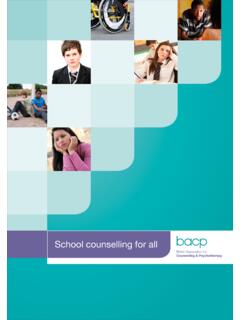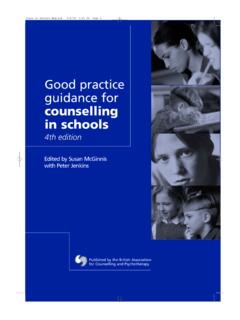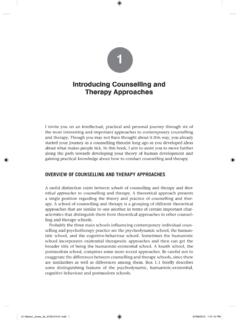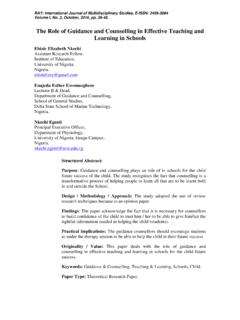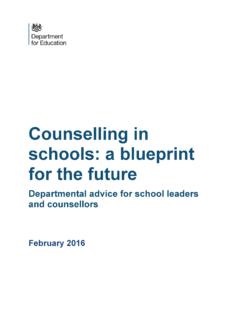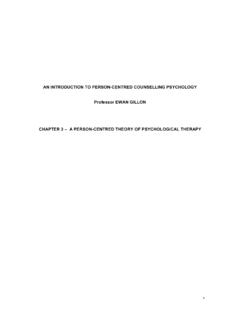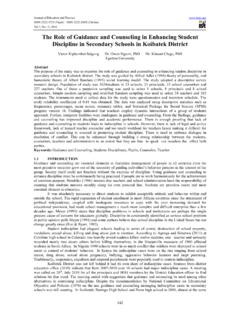Transcription of Introduction to Guidance and Counselling
1 Introduction to Guidance and (Hons) ElementaryWINDOWS ON PRACTICE GUIDE20126semesterThis product has been made possible by the support of the American People through the United States Agency for International Development (USAID). The contents of this report are the sole responsibility of the authors, and do not necessarily reflect the views of USAID or the United States Support: Education Development Center (EDC); Teachers College, Columbia (HONS) ELEMENTARYiiForewordTeacher education in Pakistan is leaping into the future. This updated Scheme of Studies is the latest milestone in a journey that began in earnest in 2006 with the development of a National Curriculum, which was later augmented by the 2008 National Professional Standards for Teachers in Pakistan and the 2010 Curriculum of Education Scheme of Studies.
2 With these foundations in place, the Higher Education Commission (HEC) and the USAID Teacher Education Project engaged faculty across the nation to develop detailed syllabi and course guides for the four-year (Hons) Elementary and the two-year Associate Degree in Education (ADE).The syllabi and course guides have been reviewed by the National Curriculum Review Committee (NCRC ) and the syllabi are approved as the updated Scheme of Studies for the ADE and (Hons) Elementary an educator, I am especially inspired by the creativity and engagement of this updated Scheme of Studies.
3 It offers the potential for a seismic change in how we educate our teachers and ultimately our country s youngsters. Colleges and universities that use programmes like these provide their students with the universally valuable tools of critical thinking, hands-on learning, and collaborative am grateful to all who have contributed to this exciting process; in particular the faculty and staff from universities, colleges, and provincial institutions who gave freely of their time and expertise for the purpose of preparing teachers with the knowledge, skills, and dispositions required for nurturing students in elementary grades.
4 Their contributions to improving the quality of basic education in Pakistan are incalculable. I would also like to thank the distinguished NCRC members, who helped further enrich the curricula by their recommendations. The generous support received from the United States Agency for International Development (USAID) enabled HEC to draw on technical assistance and subject-matter expertise of the scholars at Education Development Center, Inc., and Teachers College, Columbia University. Together, this partnership has produced a vitally important resource for DR SOHAIL NAQVIE xecutive DirectorHigher Education CommissionIslamabadHOW THIS COURSE GUIDE WAS DEVELOPEDiiiHow the Windows on Practice guide was developedAs part of nationwide reforms to improve the quality of teacher education, the Higher Education Commission (HEC), with technical assistance from the USAID Teacher Education Project, engaged faculty across the nation to develop detailed syllabi for courses in the new four-year (Hons) Elementary programme.
5 The process of designing the syllabus for each course in years 3 4 of the programme began with curriculum design workshops. Deans and directors from universities where these courses will be taught were invited to attend the workshops. In the first workshop, national and international subject matter experts led participants in a seminar focused on a review and update of subject (content) knowledge. The remainder of this workshop was spent reviewing the HEC Scheme of Studies, organizing course content across the semester, developing detailed unit descriptions, and preparing the course syllabi.
6 Although the course syllabi are designed primarily for Student Teachers taking the course, they are useful resources for teacher educators too. Following the initial workshop, faculty participants developed teaching notes that include ideas for teaching units of study and related resources. Working individually or in groups, participants focused on their own teaching methods and strategies and how these could be useful to future teachers of the course. Subsequent workshops were held over the course of a year to give faculty sufficient time to complete their work, engage in peer review, and receive critical feedback from national and international consultants.
7 In designing both the syllabi and the teaching notes, faculty and subject matter experts were guided by the National Professional Standards for Teachers in Pakistan (2009). All of the syllabi developed by faculty who participated in the workshops are included in this document, along with a list of topical teaching notes. Additional references and resources appear at the end of the document. These should provide a rich resource for faculty who will teach this course in the future. Sample syllabi with accompanying teaching notes are also included to provide new Instructors with a model for developing curricula and planning to teach.
8 This Windows on Practice guide is not intended to provide a complete curriculum with a standard syllabus and fully developed units of study, but rather aims to suggest ideas and resources for Instructors to use in their own planning. Hence, readers will find sample units and materials that reflect the perspective of faculty designers rather than prescriptions for (HONS) ELEMENTARYivWe respect intellectual property rights and to the best of our knowledge, we have not included any suggested materials that are copyright protected or for which we have not secured explicit permission to use.
9 Therefore, all materials included may be used in classrooms for educational purposes. Materials in this document are not intended for commercial use, however. They may not be used in other publications without securing permission for their drafts were reviewed by the National Curriculum Review Committee (NCRC) and suggestions were incorporated into final drafts, which were then submitted to the NCRC for approval. Faculty involved in course design: Abid Hussain Chaudry, Punjab University, Lahore; Dr Ali Murtaza, University of Azad Jammu and Kashmir, Muzzafarabad; Amir Bano, Allama Iqbal Open University, Islamabad; Liaquat Hussain, Institute of Education and Research, Gomal University, Dera Ismail Khan, Khyber Pakhtunkhwa; Maroof Bin Rauf, University of Karachi, Karachi; Mubeen Ahmed Langah, Shah Abdul Latif University, Khairpur; Muhammad Nisar-ul-Haq, Karakoram International University, Skardu; Dr Muhammad Sarwar, University of Sargodha, Sargodha.
10 Munazza Ambreen, Allama Iqbal Open University, Islamabad; Nida Mirza, University of Sindh, Jamshoro; Nadeem Khan, Institute of Education and Research, University of Peshawar, Peshawar; Raqeeb Imtiaz, University of Gujrat, Gujrat; Dr Saddaf Ayub Raja, Fatima Jinnah Women University, Rawalpindi; Shahla Ambreen, Sardar Bahadur Khan University, Quetta; and Zarghuna Naseem, University of Education, Lahore. National subject expert leading the seminar: Dr Anjum Kazmi, Dean of Education, Sindh Madressatul Islam University. National Curriculum Advisor who reviewed and compiled the Windows on Practice guide: Martin Thomas, Faculty, Notre Dame Institute of Education, Karachi.









